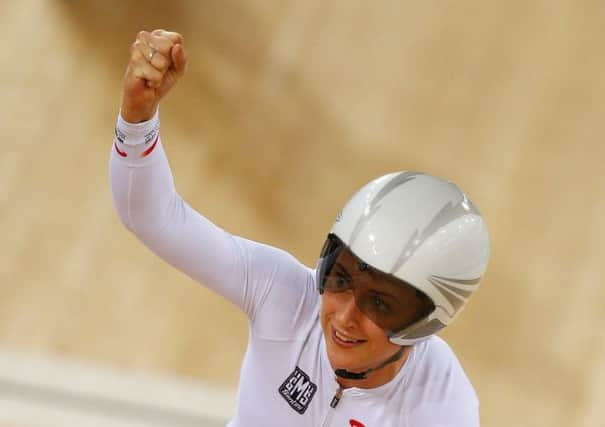Double gold for Britain in Track Cycling World Cup


There were seven Olympic gold medals for British riders to repeat the success of Beijing in 2008.
This weekend’s World Cup meeting is something of a homecoming but for much of yesterday’s opening session the London triumphs seemed a distant memory until the British women’s team pursuit squad, including Scotland’s Katie Archibald, beat Australia in a close final to maintain a remarkable four-year unbeaten record. The GB men emulated them minutes later by beating New Zealand to the gold medal in their final.
Advertisement
Hide AdAdvertisement
Hide AdWhile Archibald was jubilant, there was huge disappointment for Scotland’s Callum Skinner, the 22-year-old from Edinburgh who has not only been saddled with the responsibility of riding the anchor leg in the team sprint, but also with succeeding the previous ‘man three,’ Chris Hoy.
Hoy, who won two of his six Olympic gold medals here two years ago and is here working for the British team, was back in the velodrome last night. Unfortunately he arrived too late to see Skinner in action after a nightmare qualifying round in which the British trio, with Skinner joined by Hoy’s Olympic gold medal-winning teammates Phil Hindes and Jason Kenny, could only finish seventh. It put them out of the reckoning after a combined 45 seconds’ effort.
It was a bruising experience for Skinner, who struggled to stay with Hindes and Kenny and ran out of steam on his final, solo lap. The reason was illness. Flu swept through the British team over the past ten days, with Skinner one of the most badly affected. Kenny didn’t look in the best of health, either, doubled up and vomiting into a bag after the ride.
Grace deflected any criticism that they had fielded a below-par squad. “This trio were the best we had to race today,” he said. “Normally we’d have somebody else we could bring in as a reserve, but because of the illness, we came with the best team we could. With this illness, some days you feel great, then you feel awful the next day.”
The plan had been to win here and take the pressure off for the final round of the World Cup in Cali, Colombia, in mid-January before the world championships in Saint-Quentin-en-Yvelines, France, in February. Now, however, they might have to send their A-team to Colombia for qualifying points. “Iain [Dyer, the head coach] and I are sitting down later and working out the calculations,” said Grace.
Whatever the outcome of their calculations, Hindes seemed unperturbed. “The coach needs to do the maths,” he said. “If it doesn’t work out, then we have to go to Colombia. We will see. Colombia is a nice country.”
The women’s team sprinters, Jess Varnish and Vicky Williamson, were also disappointed, placing fifth to just miss out on a medal ride. As with the men, the women are coping with the loss through retirement of their taliswoman, Victoria Pendleton, but also with the absence of Pendleton’s successor as world champion, Becky James, with the Welshwoman still on the road back after injury.
It was left to the team pursuiters to restore pride and give the big crowd – close to a sell-out, but not quite – something to cheer. The male quartet qualified second behind the old enemy, Australia, and raced a thrilling semi-final against Denmark. It was neck-and-neck until Denmark lost a rider with five laps remaining, allowing Britain to pull slightly ahead. But the good work was almost undone on the final lap as the GB trio began to splinter. With the time taken on the third man, it needed a photo to establish that they had done just enough to qualify for the final. Led by the experienced Ed Clancy, the British men faced New Zealand in the final, moving into an early lead and building it throughout. Without Bradley Wiggins, who wants to return to this event for the Rio Olympics, they scored a convincing victory, winning by over four seconds.
Advertisement
Hide AdAdvertisement
Hide AdThe women, meanwhile, maintained their close to 100 per cent record in the team pursuit – they have been beaten only three times since 2008, and not since December 2010 – with Archibald now an established member of the team, alongside Laura Trott, Joanna Rowsell and Elinor Barker. Ciara Horne replaced Rowsell for the final but although they won, by two seconds, it was a ragged performance in the closing stages, perhaps because Archibald was simply too strong: gaps opened when she hit the front in the final laps. For the first time since the days of Hoy, Craig MacLean and Ross Edgar there were three Scots in British jerseys: young Mark Stewart, riding for GB ‘B’, acquitted himself well in the points race, finishing 15th in his first outing at this level.